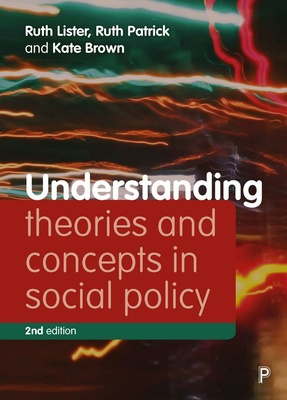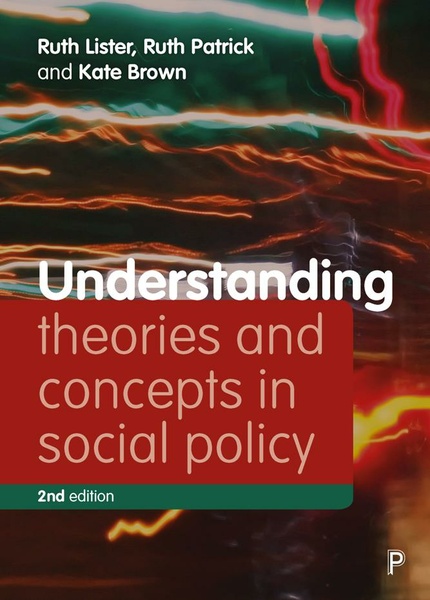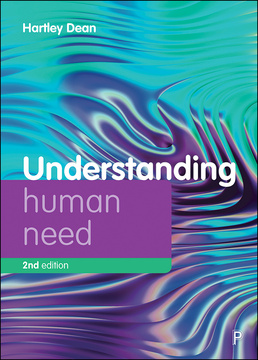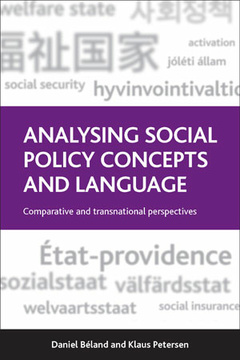Understanding Theories and Concepts in Social Policy
By Ruth Lister, Ruth Patrick and Kate Brown
Published
Feb 27, 2024Page count
364 pagesEdition
2nd EditionBrowse the series
Understanding Welfare: Social Issues, Policy and PracticeISBN
978-1447338383Dimensions
244 x 170 mmImprint
Policy PressPublished
Feb 27, 2024Page count
364 pagesEdition
2nd EditionBrowse the series
Understanding Welfare: Social Issues, Policy and PracticeISBN
978-1447338390Dimensions
244 x 170 mmImprint
Policy PressPublished
Feb 27, 2024Page count
364 pagesEdition
2nd EditionBrowse the series
Understanding Welfare: Social Issues, Policy and PracticeISBN
978-1447338390Dimensions
244 x 170 mmImprint
Policy PressDemonstrating the relevance of theory to political and policy debates and practice, this lively and accessible second edition helps students to grasp the real-life implications of social policy theory.
The updated text includes consideration of contemporary shifts in welfare ideologies in the context of global austerity and the UK Coalition and Conservative governments since 2010. With a new chapter focusing on critical debates about disability, sexuality and the environment, this textbook also includes fresh reflections on migration, conditionality, resilience, social justice and human rights.
Key features include:
•real-life examples from UK and international politics and policy to explain and illuminate the significance of social policy theory;
•key questions for student reflection and engagement; and
•bulleted chapter summaries and annotated further readings at the end of every chapter.
This new edition is a dynamic, engaging and valuable introduction to the key theoretical perspectives and concepts deployed in social policy.
"A valuable introduction to the range of theories used in social policy, and a beautifully clear exposition of what theory is and why it matters. Essential reading." Kitty Stewart, London School of Economics and Political Science
“An accessible and engaging book written by leading figures in the field that can help student and seasoned professional alike unpack the assumptions and ideas that inform what governments do.” Aaron Reeves, University of Oxford
"I am absolutely delighted that the authors updated and extended the first edition as it is so hard to find a credible source that conveys the critical importance of theories and political ideologies to social policy in an accessible fashion without compromising complexity. This book certainly does it." Sebnem Eroglu-Hawksworth, University of Bristol
“A wonderfully accessible and comprehensive presentation of theories and concepts of social policy. It fully engages the reader by bringing to life the complexities and nuances of different perspectives.” Fiona Williams, Emeritus Professor of Social Policy, University of Leeds
Ruth Lister is Emeritus Professor of Social Policy at Loughborough University and a member of the House of Lords.
Ruth Patrick is Professor of Social Policy at the University of York.
Kate Brown is Senior Lecturer in Social Policy and Criminal Justice at the University of York.
Part 1: Theoretical Perspectives in the Political Arena
Introduction: Laying the Groundwork
1. Dominant Post-War Ideological Perspectives: The ‘Middle Way’, ‘Third Way’ and Beyond
2. Critical Perspectives I: Marxism, Feminism and Anti-Racism
3. Critical Perspectives II: Disability Theory, Sexuality and Environmentalism
Part 2: Theoretical Perspectives as an Analytical Tool
4. Post-Fordism and Postmodernism
5. Social Control, Regulation and Resistance
6. What’s the Problem? Social Constructionism
Part 3: Concepts
7. Needs
8. Citizenship and Community
9. Liberty, Equality and Social Justice
10. Conclusion: Bringing It All Together – Theory and Social Change











